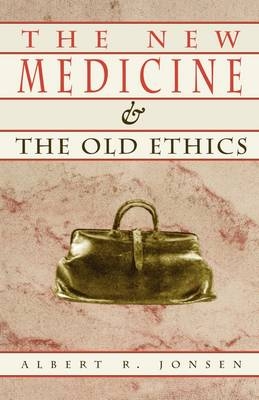
The New Medicine and the Old Ethics
Seiten
1992
Harvard University Press (Verlag)
978-0-674-61726-1 (ISBN)
Harvard University Press (Verlag)
978-0-674-61726-1 (ISBN)
Placing the medical profession in its historical context, Jonsen describes its ethical tensions. He addresses the conflict between altruism and self-interest which he believes is built into the structure of medical care and woven into the very fabric of physicians' lives.
The history of medicine is a record of scientific discovery, clinical triumph, and personal sacrifice; it is also a record of obscurantism, dogmatism, and greed. In this humane book one of our leading medical ethicists addresses the conflict between altruism and self-interest, which he believes is built into the structure of medical care and woven into the very fabric of physicians’ lives. In the process, he reveals both the wisdom and the weaknesses of traditional ethics in an era of innovative—and controversial—health care.
This new medicine, only now coming into being, is no longer patient based. Patients are, more than ever before, representatives of a class—individuals with AIDS, the elderly, the comatose, the indigent—and the approach to treatment is influenced by the population from which those patients come. In addition, Albert Jonsen points out, medicine has moved from being an institution in which the physician is the dominant actor, the patient-physician relation the dominant scenario, and diagnosis and therapy the dominant script, to an institution in which physicians, a multitude of other providers, and newly empowered patients share equal billing. Jonsen calls for a return to the methods and values of the humanities, which he calls “the hormones that course through the complex institution of medicine and that enable it to respond to the constantly changing scientific, social, and economic environment.” Medicine must call up its memories and reflect upon its values.
Ranging through history from the mythical Asclepius to the latest recipient of a transplanted heart, Jonsen reformulates the old ethics in terms that bring justice, competence, and compassion to bear on contemporary biomedical dilemmas. This is clearly a book to be read not only by members of the healing and helping professions but by every thinking person.
The history of medicine is a record of scientific discovery, clinical triumph, and personal sacrifice; it is also a record of obscurantism, dogmatism, and greed. In this humane book one of our leading medical ethicists addresses the conflict between altruism and self-interest, which he believes is built into the structure of medical care and woven into the very fabric of physicians’ lives. In the process, he reveals both the wisdom and the weaknesses of traditional ethics in an era of innovative—and controversial—health care.
This new medicine, only now coming into being, is no longer patient based. Patients are, more than ever before, representatives of a class—individuals with AIDS, the elderly, the comatose, the indigent—and the approach to treatment is influenced by the population from which those patients come. In addition, Albert Jonsen points out, medicine has moved from being an institution in which the physician is the dominant actor, the patient-physician relation the dominant scenario, and diagnosis and therapy the dominant script, to an institution in which physicians, a multitude of other providers, and newly empowered patients share equal billing. Jonsen calls for a return to the methods and values of the humanities, which he calls “the hormones that course through the complex institution of medicine and that enable it to respond to the constantly changing scientific, social, and economic environment.” Medicine must call up its memories and reflect upon its values.
Ranging through history from the mythical Asclepius to the latest recipient of a transplanted heart, Jonsen reformulates the old ethics in terms that bring justice, competence, and compassion to bear on contemporary biomedical dilemmas. This is clearly a book to be read not only by members of the healing and helping professions but by every thinking person.
Watching the doctor; asklepios as intensivist; the good samaritan as gatekeeper; the nobility of medicine; doctor Locke and doctors' rights; Bentham in his box; the snake and the saints; humanities are the hormones.
| Erscheint lt. Verlag | 23.4.1992 |
|---|---|
| Verlagsort | Cambridge, Mass |
| Sprache | englisch |
| Maße | 140 x 210 mm |
| Gewicht | 222 g |
| Themenwelt | Geisteswissenschaften ► Philosophie ► Ethik |
| Medizin / Pharmazie ► Medizinische Fachgebiete ► Medizinethik | |
| Studium ► Querschnittsbereiche ► Geschichte / Ethik der Medizin | |
| ISBN-10 | 0-674-61726-6 / 0674617266 |
| ISBN-13 | 978-0-674-61726-1 / 9780674617261 |
| Zustand | Neuware |
| Haben Sie eine Frage zum Produkt? |
Mehr entdecken
aus dem Bereich
aus dem Bereich
Die Geschichte eines Weltzentrums der Medizin von 1710 bis zur …
Buch | Softcover (2021)
Lehmanns Media (Verlag)
CHF 27,90
von der Antike bis zur Gegenwart
Buch | Softcover (2024)
C.H.Beck (Verlag)
CHF 16,80
Krankheitslehren, Irrwege, Behandlungsformen
Buch | Softcover (2024)
C.H.Beck (Verlag)
CHF 55,90


